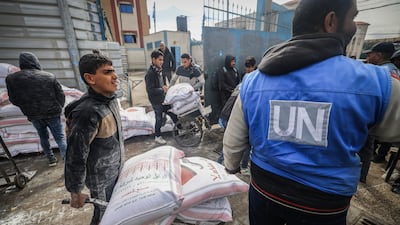Live updates: Follow the latest news on Israel-Gaza
Norway will increase its funding to the UN's agency for Palestinian refugees amid fears of an economic collapse in the occupied West Bank, where Israel has imposed harsh restrictions on money transfers.
The UNRWA, which has played a critical role in providing services in the Gaza Strip, will receive an additional $10 million, Oslo said.
The agency has been cut off from funding by several western governments since January, when Israel alleged that 12 of its employees had taken part in the Hamas-led October 7 attacks.
The UNRWA had about 13,000 employees in the enclave at the time of the attacks, during which militants killed about 1,200 people and took 240 hostages.
Israel's retaliatory air and ground campaign in Gaza has killed more than 37,300 people, according to health authorities in the enclave.
The Israeli allegations prompted several countries, including the US – the UNRWA's top donor – to suspend funding to the agency, although many have since resumed payments.
An independent inquiry led by former French foreign minister Catherine Colonna found that Israel had not provided sufficient evidence to support its allegations.
“The UNRWA is the backbone of the humanitarian response in Gaza,” Norwegian International Development Minister Anne Beathe Kristiansen Tvinnereim said on Monday.
“The war, the accusations made by Israel, continuous attacks on the organisation and funds withheld by major donors have put the UNRWA in an extremely difficult financial situation.”
West Bank crisis
Norwegian Foreign Minister Espen Barth Eide warned that the Palestinian Authority, which governs the West Bank, was facing an economic collapse as a result of restrictions on money transfers introduced by Israel's far-right Finance Minister, Bezalel Smotrich.
Israel is supposed to collect import tax, VAT and other fees on behalf of the authority and transfer the funds under a system established under the Oslo Accords in the 1990s.
However, the transfers were cut twice – in November this year, and last month – and some of the funds were diverted to Israeli survivors of attacks by Hamas and other Palestinian militant groups.
The West Bank’s economy was already fragile as a result of regular Israeli military raids and road closures in cities such as Jenin and Nablus.
Business activity in the territory has slowed since the outbreak of the Gaza war, with increased Israeli military activity and settler violence having led to the deaths of about 530 Palestinians in the West Bank since October. At least 14 Israelis have been killed during the same period, according to an AFP tally.
Meanwhile, about 170,000 Palestinians who had previously travelled to Israel for work can no longer do so, and the Palestinian Authority has struggled to pay more than half of its public sector employees.
Mr Smotrich explained the restrictions by accusing the authority of “encouraging and favouring terrorism by paying the families of terrorists, prisoners and released prisoners”.
“In accordance with the judgments that awarded compensation to the victims of terrorism, we offset the same amounts from the Palestinian Authority’s funds and are transferring the awarded money to the families of the victims of terrorism,” he added.
The authority owes about $5 billion and depends on the revenue transfers from Israel, which amount to about $170 million a month.
Last week, Group of Seven leaders said that the UNRWA must be allowed to work unhindered in Gaza.
At its summit in Italy last week, the bloc called for all parties to enable the “rapid and unimpeded passage of humanitarian relief for civilians in need” in the enclave, particularly women and children.

